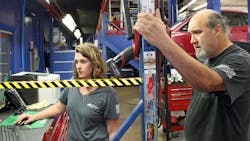In the New York Times bestseller “Talent is Overrated,” author Geoff Colvin outlines the proper progression of growth using a diagram of concentric circles that resembles a target. In the center is the comfort zone, outside of it is the learning zone and the circle furthest orbiting the center is the panic zone. Colvin says the best progress happens when a person steps from comfort zone to learning zone. The new skills come easier, and the work is challenging enough to keep one engaged without creating panic—but that doesn’t mean it’s not difficult.
For Christie Briggs Black of ABS Unlimited Auto Repair in Fairfax, Virginia, her traverse from service advisor to foreman placed her out of her comfort zone and deep into the learning zone.
Backstory
Briggs Black joined her parents’ auto repair shop in 2010. She flowed her bubbly personality and marketing experience into a position as a service advisor where she excelled for the next 13 years. When the opportunity arose for the shop to replace its existing foreman, she stepped forward.
Problem
Briggs Black entered the foreman role during the spring of 2023. Her predecessor was what she calls “a typical car guy” and, being female and non-technical, she felt intimidated in making the move—like an imposter. However, she remained true to herself and when she took leadership of the back of the house, she focused on being a nurturing presence to the technicians.
"I was a little skeptical of myself. I think we all are when we step into something we're not completely comfortable with, but I had to learn some things. I felt like I was annoying the living daylights out of them. I was constantly looking at what they were doing. I started doing the oil drains to show the guys that I'm out here and I'm going to get dirty. I just really tried to immerse myself in that world and it really was a big change. I was learning their day-to-day,” she says.
Solution
Briggs Black decided to roll up her sleeves and get into the trenches with her technicians. She saw the change as an opportunity to be a student as well as a leader. She worked with the team, talked to them, asked questions and looked for ways to serve. Briggs Black says taking the time to engage with the team helped to warm them up to her.
"The guys really received me well. I feel like when I connect with them, I truly connect with them,” Briggs Black says. “It makes them feel heard and cared about which goes a long way for all of us.”
Aftermath
Despite respect not being a problem since the team was already familiar with her as an advisor, she felt the loyalty she received from the technicians was genuine and earned through how she took to the position. Briggs Black contends that she is still learning, but it grows easier by the day.
“I really do enjoy pushing myself and the guys’ respect level for me was amazing. You would think that a woman would go out in the shop, and they might get a little bit scoffed, but that was not the reaction at all. They embraced it,” she says. “I went into it with a huge amount of humility. I don't think that I'm better than any of these guys.”
Takeaway
Briggs Black leaned on the skills she developed in her near decade-and-a-half as a service advisor as a springboard for succeeding as a foreman. She used the same curiosity that won her customers over to win the trust of her technicians. She relied on the organization and attention to detail she employed in the front of the house to lead the back. But most of all, she listened and let her techs know that their concerns were hers. She was their advocate—their top cheerleader and prizefighter if need be. And true to Colvin’s book, once the learning zone shrinks, it becomes your next comfort zone. Today, Briggs Black feels a deeper sense of ownership and belonging to the position.
“You've got to have confidence in yourself, even if you do have impostor syndrome, right? If you've been working in this industry, you know something about it. I think that women can bring a lot of different qualities (to the shop) based off one's personality. That can help make people feel heard and known and cared about,” she says. “And as much as that's not the bottom line, that's important. If you have happy team members, they're going to be more productive. That’s a win for everybody.”
About the Author
Chris Jones
Group Editorial Director
Chris Jones is group editorial director for the Vehicle Service & Repair Group at EndeavorB2B.
A multiple-award-winning editor and journalist, and a certified project manager, he provides editorial leadership for the auto care industry's most trusted automotive repair publications—Ratchet+Wrench, Modern Tire Dealer, National Oil & Lube News, FenderBender, ABRN, Professional Distributor, PTEN, Motor Age, and Aftermarket Business World.
Subscribe to receive news and updates from any of these industry-leading brands.

